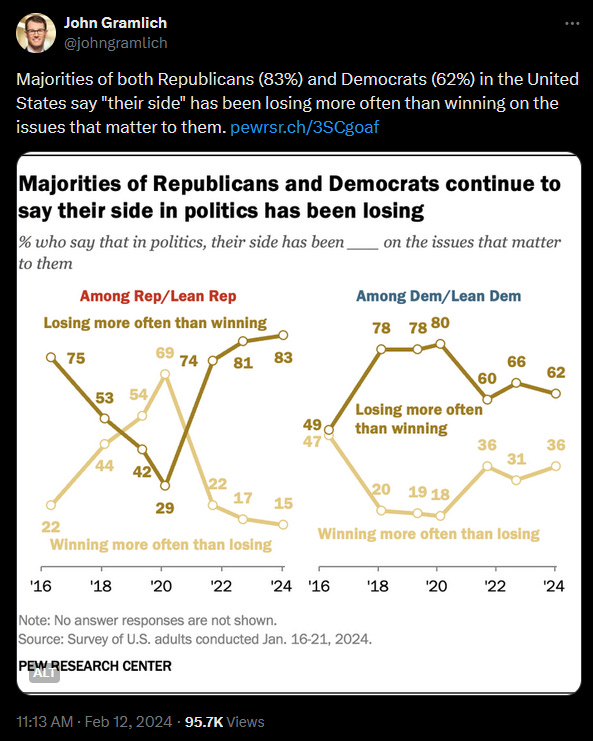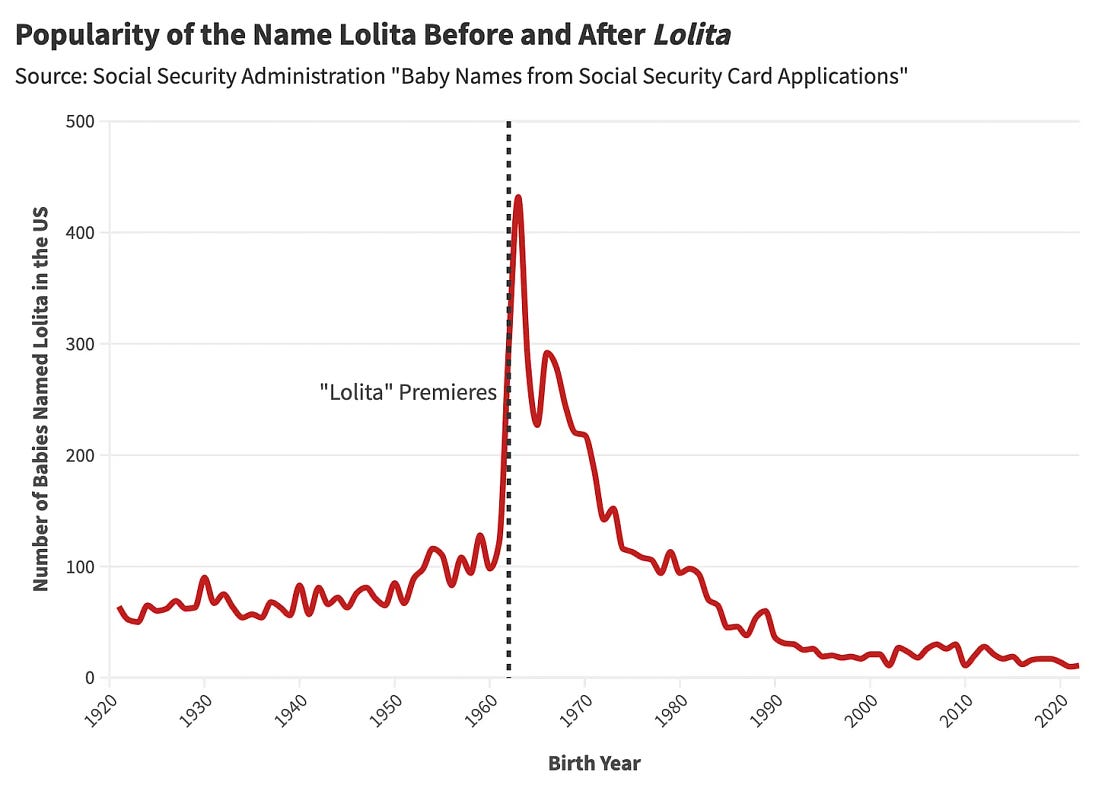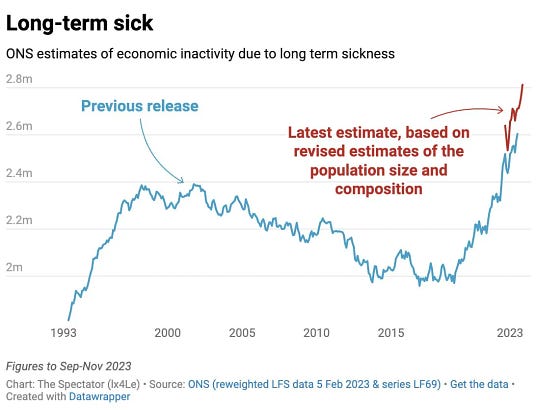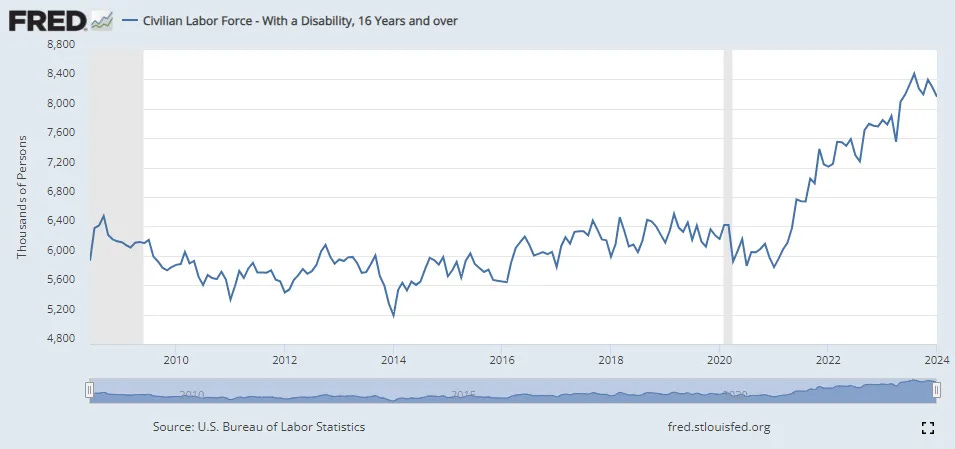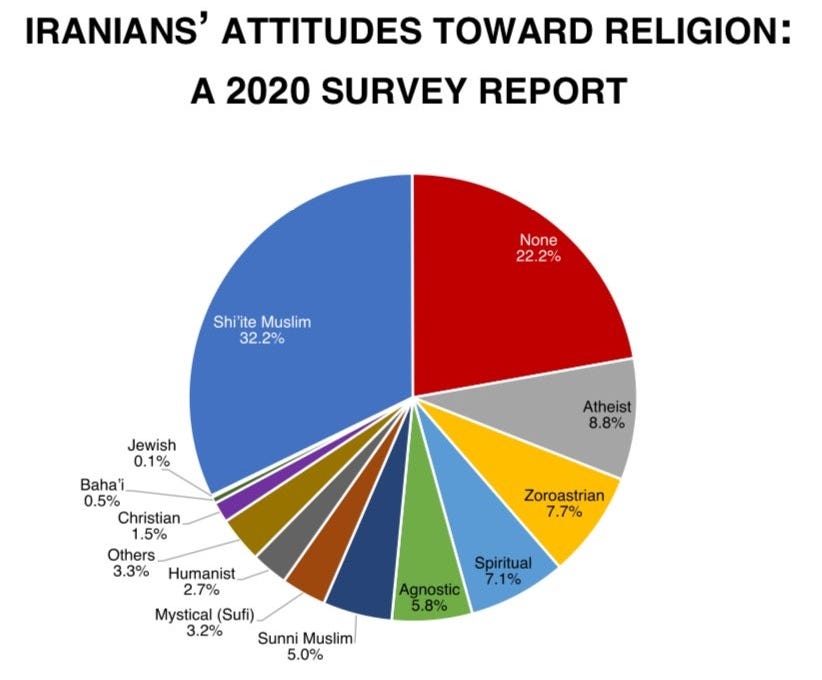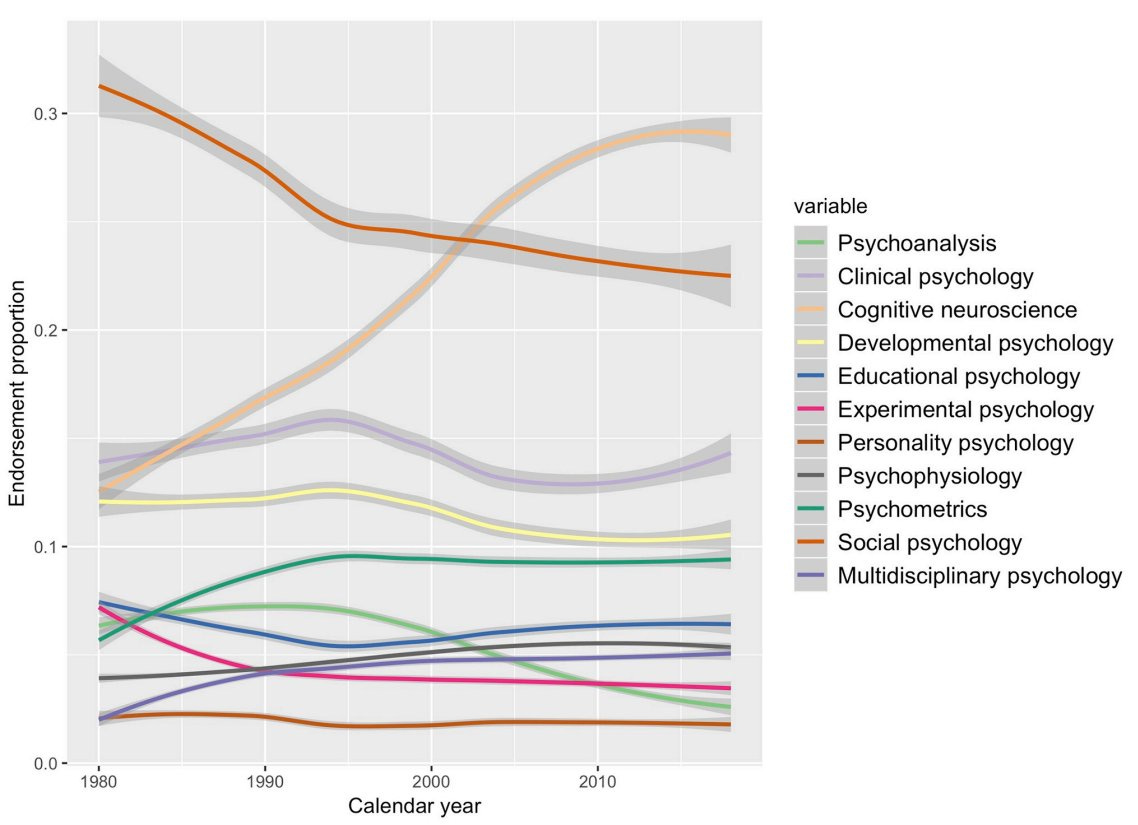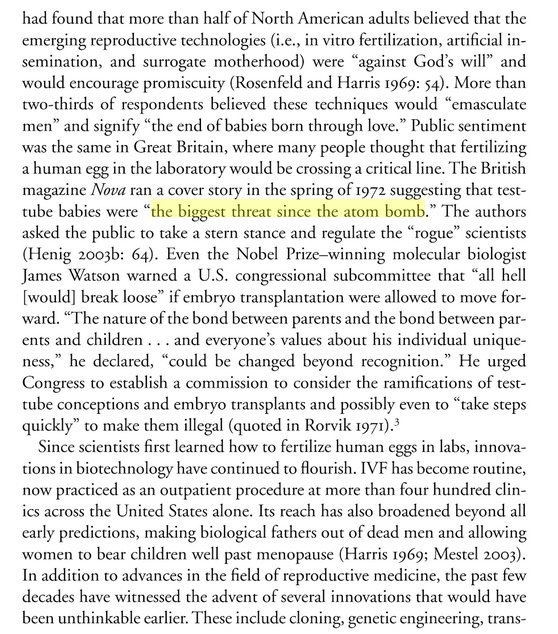Astral Codex Ten - Links For February 2024
[I haven’t independently verified each link. On average, commenters will end up spotting evidence that around two or three of the links in each links post are wrong or misleading. I correct these as I see them, and will highlight important corrections later, but I can’t guarantee I will have caught them all by the time you read this.] 1: Claim (h/t @teortaxestex) “Most blind mathematicians work in geometry and topology. It is argued that the spatial intuition of sighted people is degraded by the triviality of retinal perception.” 2: Italy’s Basilica of the Holy House is supposedly built atop the house where the Virgin Mary raised Jesus. Why is the Virgin Mary’s house in Italy? Supposedly angels carried it there from Israel just before the Saracens’ final victory over the Crusaders. Sounds suspicious, but the house in the Basilica appears to be a genuine 1st century Palestinian dwelling. One theory: it was shipped to Italy by the Angelos family, and the angels story was a later mistranslation. 3: A surprising puzzle from @finmoorhouse: “Imagine you begin a journey in Seattle WA, facing exactly due east. Then start traveling forward, in a straight line along the Earth's surface. You will travel across North America, and onto the Atlantic Ocean. Eventually, you will hit another country. What is the first country you hit?” Answer here. 4: Polypharmacy blog has some good psychiatry content. I especially liked Stop Twisting Yourself Into Knots About QTc, which is one of those things lots of people know but which takes bravery (and a lot of tough scholarship to justify your controversial position) to say. I would add Outcomes of Citalopram Dosage Risk Mitigation in a Veteran Population to the pile of evidence. 5: Yawboadu on the Ethiopian economic miracle. In 2002, Ethiopia was the poorest country in Africa, but since then it's grown at 9%/year for twenty years, even as the rest of the continent languishes. Yaw tells a familiar story; Ethiopia was taken over by communists in the 70s, they caused mass starvation, but after they were overthrown the country shot up the development ladder. We can add them to the list of other successful ex-communist or liberalized-communist countries like Poland, China, and Vietnam. What’s the common factor? Plausibly land reform. The communists redistributed the land, this didn't help when the country was still under communism, but liberalized economy + land reform is the secret combination. In support of this, Yaw says that "Ethiopia's rapid growth in comparison to many African nations is attributed to a significant increase in agricultural productivity". Ethiopia did other things right, but the land reform seems like the one that separates it from every other lower-income country trying to get on the development ladder. 6: It’s Okay To Want Your Children To Be Healthy Even If The World Falls Apart - BPodgursky’s defense of polygenic selection. This is a response to the people saying polygenic selection is bad, because we should instead make parents have children with diseases, then treat the diseases with medication. BPodgursky’s counterargument is that this goes badly if the economy collapses and medications become less accessible. This is surely true, but seems like only a very weak argument compared to “why should we force people to stay dependent on expensive, inconvenient, and side-effect medication when we can just not do this?” I’m honestly weirded out that we have to make this argument at all; still, it seems like we do, and BPodgursky does a good job. 7: Related: Awais Aftab has a new post about polygenic screening and how likely it is to perform up to its advertised standard in reducing schizophrenia risk. My response here. 8: @literalbanana’s take on recent plagiarism scandals - plagiarism isn’t that important on its own, but “since copy-pasting is already against the rules, and is highly legible and verifiable, it seems like a relatively easy thing to enforce to get rid of the laziest and/or most incompetent >1% of the literature and the field.” 9: @BoyanSlat reads “every page of OurWorldInData” and lists his favorite discoveries, including:
10: Claim: psi effects have not declined - studies trying to detect ESP find just as much of it today (with our greater attention to methodological rigor) as they did decades ago (h/t Rolf Degen) 11: George Psalmanazar (1679 - 1763) was “a Frenchman who claimed to be the first native of Formosa (today Taiwan) to visit Europe”. He explained away his white skin by saying that Taiwanese people lived underground. Psalmanazar invented an incredibly elaborate fake Taiwanese language, mythology, and custom, and was briefly an 18th-century-England viral sensation. Eventually some people who had actually been to Taiwan called his bluff, he confessed, and he settled down as a writer and theologian, befriending Samuel Johnson and other British intellectuals. 12: Did you know: by a 52-48 margin, black people approve of the Supreme Court’s recent decision to ban affirmative action at universities. Big age gap; older black people are mostly against, younger mostly for. But there’s some reason to think that many of them didn’t entirely understand the ruling and thought it banned pro-white racism or something; a majority of young black adults think the decision will make it easier for blacks to attend university. 13: Claim: venture capital firm A16Z testified to the British House of Lords that AI interpretability has been “resolved” and the logic behind AI decisions is now fully transparent. No AI researcher would support this claim (despite some recent promising first steps), suggesting A16Z either doesn’t understand even the very basics of the field it’s investing in, or else that they’re committing perjury. Zvi discusses here, CTRL+F “The Quest For Sane Regulations”. 14: Nongqawuse (born 1841) was a prophetess of the Xhosa people (related to Zulus, South Africa). When she was 15, she claimed the spirits told the Xhosa to kill all their cattle as a sacrifice; in exchange, they would bring utopia and drive away the encroaching British. The Xhosa believed her and killed all their cattle. In the ensuing famine, 75,000 out of 100,000 Xhosa died, and the British easily took over their territory. 15: A story about Khruschev (h/t @JackTindale, taken from The Soviet Sixties):
16: Max Progress: Surgery Works Well Without The FDA, supporting the possibility that drug approval could also work well without them. Counterargument by Alex Telford, But Does Surgery Really Work Well Without The FDA? 17: There’s a verse in Chesterton’s Lepanto where he describes the ascended spiritual Mohammed as having a “turban that is woven of the sunsets and the seas”. If you’ve ever wondered what that would look like, I recommend this StableDiffusion video by Herolias (you might have to go very close and/or very far from your computer to get the full effect; I also recommend pausing mid-video to see how innocuous each frame looks on its own). 18: Thomas Piketty (plus coauthors) is the most famous historians of inequality, and says it has increased dramatically in recent decades. Now Auten & Splinter have new data challenging their position. Here’s Piketty etc’s response, Tyler Cowen’s commentary, and Vincent Geloso’s commentary. 19: Claim: nine people in a family in Scotland have a mutation in the RIMS1 gene, which makes them go blind in their twenties and also apparently adds 20 IQ points. Large single-gene effects on IQ are not supposed to exist, but it’s theoretically possible that a rare mutation with a big downside could do it. I’m still a little skeptical, because this seems trivial enough that evolution should have found a way to do it without the blindness by now. But at least on a superficial reading the paper looks good. 20: Related: Sebastian Jensen at CSPI looks into the dysgenic hypothesis: are we getting dumber because more intelligent people are less likely to have children? Answer: this is happening more in poorer countries, less in richer ones. IQ decline per decade “ranges from as low as 0.01 points in the Estonia and Switzerland to 0.65 points in Panama, Romania, and North Macedonia”. USA is 0.38, which I think agrees with other estimates, although realistically immigration effects will dominate. “The fact that the rate of decline is so fast implies that even if IQ differences between nations are completely environmentally determined today, over the coming decades there may still be a significant [genetic] divergence between them.” 21 The Crash At Crush: In 1896, a railroad company decided to get rid of its spare trains by crashing them into each other at top speed as a “public spectacle”. What could go wrong? “Unexpectedly, the impact caused both engine boilers to explode, resulting in a shower of flying debris that killed two people and caused numerous injuries among the spectators.” And one for the nominative determinism bucket - the event was coordinated by Mr. William Crush. 22: Congrats to ACX commenter TracingWoodgrains, who has made a significant contribution to a national news story by finding new information on the FAA’s attempt to discriminate in favor of black air traffic control applicants. The FAA deprioritized a standardized test in favor of a “biographical questionnaire”, then gave black organizations code words that they could tell their members to use on the questionnaire to gain extra points. For example, you got zero points for having previous air traffic experience, but lots of points if you said your worst grades in high school were in science, or that you’d been unemployed for the past three years. Hundreds of qualified applicants who got top grades in the supposedly FAA-endorsed education system for air traffic controllers were turned away in favor of people who gave the “right” answers to the biographical questions. 23: Related: There was a lot of discussion a few years ago about charts showing frequency of “woke” words in the NYT. David Rozado investigates how those words have been doing since then and whether we’re “past peak wokeness” (it’s different for different words, but overall maybe slightly past?) 24: The first case reports of cadaver-to-human transmission of Alzheimer’s Disease. In the mid-20th-century, the standard treatment for dwarfism was ground up pituitary gland from the brain of a dead person. Scientists have now found that dwarfs who got pituitaries from dead people with Alzheimers developed very early Alzheimers themselves, often in their 40s. I already knew Alzheimers involved misfolded proteins, so this shouldn’t have been surprising, but I still somehow failed to think of it as a prion disease. This shows that misfolded proteins are sufficient to cause Alzheimers (with a 30 year delay? Sure, I guess, maybe that’s how long it takes a prion to spread). I’m not sure what’s left of the Alzheimers origin debate. Should we just assume that this is a protein that tends to go prion-y after enough time, or is there more to discover? 25: Interview with ACX Grantee Will Jarvis on Georgism and his company ValueBase. 26: Did you know: lots of religions have their own version of LEGO, usually with sets depicting their mythology or temples. Islam has Muslim Blocks, Hinduism has Indic Bricks, and Judaism has Binyan Blocks. But my favorite is Mormonism with - wait for it - Brick’em Young (h/t @seanw_m) (also, no offense to Islam, but the Kaaba is the most boring possible building to make a LEGO set for, sorry) 27: Tatu Ahponen gives potential extra background on the DSA budget crisis. 28: Joe Carlsmith’s commentary on C.S. Lewis’ Abolition Of Man, with an EA and AI alignment bent. 29: Two great essays on organ donation laws recently, The Fitzwilliam’s Organ Donation Law: Much More Than You Wanted To Know and Works In Progress’ Compensating Compassion. The Fitzwilliam’s focuses on an underwhelming new Irish law, and also tells the author’s story (he tried to donate a kidney, but got rejected for being too young - he was in his twenties - which is one I’ve never heard before). Works In Progress surveys laws around the world; I’m especially interested in Israel’s approach (written up by MR here), which says that people who previously agreed to donate after their death get priority for organs when alive. 30: This is pretty obvious but at least we have numbers for it now: …I said it was pretty obvious, like it’s a law of nature, but maybe that’s not true? Republicans thought they were winning as recently as 2020; Democrats were very close to thinking it in 2016. So you could also make an argument that whichever side doesn’t have the President thinks they’re losing, up until the Biden administration, when Democrats decided they were losing even though they had Biden. But Republicans thought they were losing until halfway into the Trump administration, then changed their minds, even though the Dems won the House that year. Why? 31: If you read my post a few weeks ago on the paper about AI sleeper agents, you might also be interested in Michael Trazzi’s video interview with lead author Evan Hubinger (transcript available here). 32: Which Movies Popularized Or Tarnished Baby Names: A Statistical Analysis. Daniel Parris finds that most big movies increase the popularity of the names of their main characters. It’s very hard to find cases where a negative portrayal of a character decreases popularity of a name, and in fact even very negative portrayals tend to increase it: “Damien”, “Freddy”, and “Lolita” went up after The Omen, Nightmare on Elm Street, and Lolita, respectively. This is in contrast to real-life bad press, which does decrease names’ popularity - for example, “Monica” went way down after the Monica Lewinsky scandal. 33: Works in Progress: Scaling Phage Therapy. One of this year’s ACX Grants went to a phage research group, and I mentioned the contrast between the years of research on phages with generally good results and the limited clinical applications. This piece tells more of the story: bacteriophages do work, but they’re usually hyperspecialized to specific strains of bacteria, and it’s hard to keep a giant library of thousands of phage types around and then match whatever bacterium your patient has to the right phage. Still, people are working on it and the tech is gradually advancing. 34: Mass Disabling Event Denial: we’ve talked before about how you would expect Long COVID to be causing a lot more problems than we hear about, and so either Long COVID is overhyped, or we’re bad at hearing about things. This article argues for the latter, suggesting that the disability data look exactly like they would if Long COVID was a huge and growing problem, and for some reason it’s just being ignored: 35: List Of Things Unexpectedly Named After People. Baker’s chocolate was named after its inventor, Walter Baker. Main Street, San Francisco was named after shipping magnate Charles Main. And so on. 36: Claim: a study finds that completely anonymous comments sections are bad for discourse, real-name comments sections are better, and consistent-pseudonym comments sections (like Substack) are best of all! It doesn’t surprise me that consistent-pseudonym comments are no worse than real-name ones, but I don’t understand why they would be better, and I don’t feel like this link really explains it. X: Eric Drexler’s 2019 report Reframing Superintelligence is one of the works of AI futurism that’s aged the best in our current LLM era, and I give him lots of credit for his successful prediction. Now he has a new AI futurism blog on Substack, AI Prospects. 37: Did you know: Matt Taibbi used to play professional baseball in Uzbekistan - and, after that, professional basketball in Mongolia. 38: Vaticidal Prophet responds to my It’s Fair To Call Schizophrenia Probably Mostly Genetic with a post on Is Traumatic Brain Injury “Caused By Genes”? You can see my response here, and Vat’s counter-response below. 39: Claim (h/t @NiohBerg, @eigenrobot): “Islam is dying in Iran” Iranians in the comments chiming in to say this matches their experience. Also, notice the 7.7% Zoroastrian! Official Iranian numbers say there are about 25K Zoroastrians in Iran, but this suggests more like 7 million! This Wiki article suggests that the 25K are ancestral Zoroastrians, and the other 6.975 million are people who are “expressing Persian nationalism and a desire for an alternative to Islam, rather than strict adherence to the Zoroastrian faith”. 40: Related: Travelogue on Azerbaijan 41: How bad is it to marry a cousin? New study suggests offspring of cousin marriages live on average three years less than expected. 42: A while ago I discussed the “scientific search engine” Consensus; I expressed skepticism that you could make it work without AIs that were good at natural language. Now it’s a few years later, we have AIs that are good at natural language, and Consensus has incorporated them. So how’s it going? I asked it whether SSRIs are safe during pregnancy. It said: Compare this to the Mayo Clinic:
I think the Mayo Clinic summary is much better. I’m still not at a point where I would use Consensus without checking its answers carefully. 43: New meta-analysis claims that exercise is at least as effective as SSRIs against depression (study, popular article). But Cremieux digs deeper and finds some of the included studies have effect sizes between 5 and 12, too large to possibly be real (he describes this as “like the effect size of taking a punch to the face on having a hurt jaw”). He thinks he’s identified some major coding errors that might be influencing the result. 44: You’ve probably heard of Jeanne Calment, oldest person ever. Maybe you’ve even heard that some people think the documents were fudged and her record is fraudulent. Now there’s a similar conflict over the oldest dog ever, whose 31 year lifespan so outclassed the previous record-holder (23 years) that the Guinness Book Of World Records will be investigating his title. 45: You’ve probably seen this, but: Nat Friedman announces that a team has won his competition to start decoding an ancient Roman library buried during the Vesuvius eruption. The first text seems to be a work by the philosopher Philodemus on the pleasures of life. In theory the buried library could hold more classical text than the total existing classical corpus (although much of it will be copies of works we already have). 46: Did you know: the Gaza Strip has (had?) a higher GDP per capita than India. I’m not sure what to think upon learning this. Obviously Gaza’s main problems aren’t economic, and being invaded and bombed is bad no matter how good your economy is. But I also had a sense that Gaza was a uniquely bad economic basketcase even before the recent war. How good a measure is GDP when a country is under severe sanctions? What about when one country is mostly rural and the other mosty urban? Or is this just another case of Westerners being unable to comprehend the scale of suffering caused by ordinary global poverty? 47: Review of the Yarvin vs. Hanania debate (monarchy vs. democracy) in Los Angeles. Reviewer says Yarvin was a sufficiently skilled public speaker that he won by dominating the conversation, but that it didn’t seem like much light was shed on the relative merits of various governments. 48: A zoomable, translated version of the 15th century Mappa Mundi. If you’ve ever wondered what the tiny Latin text on giant medieval maps looks like, it’s things like:
49: Which branches of psychology are becoming more or less popular over time? (h/t @PsychoSchmitt) I think this is percent of published psychologists whose Google Scholar profiles mention working in a certain field: Experimental psychology (and psychoanalysis) going way down, cognitive neuroscience going way up. 50: 51: Sotonye Jack, along with his other writing, interviews interesting people in tech, blogging, and academia. This month he interviewed me. 52: According to NYT, during his time in prison Sam Bankman-Fried has tried to convince the guards to buy the Solana cryptocurrency. In fairness to him, it’s gone up in value about 10x since his arrest. That means there’s some prison guard who got a hot tip from SBF to put his net worth in Solana, laughed because of course you don’t take investing advice from SBF, and then had to watch while as it dectupled in price over the next year. 53: @SilverVVulpes on the original response to in vitro fertilization - “magazines were calling it the biggest threat since the atom bomb”: 54: …and if these aren’t enough links for you, you can find another seventy-odd links at Zvi’s February links post. You're currently a free subscriber to Astral Codex Ten. For the full experience, upgrade your subscription. |
Older messages
Less Utilitarian Than Thou
Wednesday, February 28, 2024
... ͏ ͏ ͏ ͏ ͏ ͏ ͏ ͏ ͏ ͏ ͏ ͏ ͏ ͏ ͏ ͏ ͏ ͏ ͏ ͏ ͏ ͏ ͏ ͏ ͏ ͏ ͏ ͏ ͏ ͏ ͏ ͏ ͏ ͏ ͏ ͏ ͏ ͏ ͏ ͏ ͏ ͏ ͏ ͏ ͏ ͏ ͏ ͏ ͏ ͏
Open Thread 317
Monday, February 26, 2024
... ͏ ͏ ͏ ͏ ͏ ͏ ͏ ͏ ͏ ͏ ͏ ͏ ͏ ͏ ͏ ͏ ͏ ͏ ͏ ͏ ͏ ͏ ͏ ͏ ͏ ͏ ͏ ͏ ͏ ͏ ͏ ͏ ͏ ͏ ͏ ͏ ͏ ͏ ͏ ͏ ͏ ͏ ͏ ͏ ͏ ͏ ͏ ͏ ͏ ͏
Who Does Polygenic Selection Help?
Friday, February 23, 2024
... ͏ ͏ ͏ ͏ ͏ ͏ ͏ ͏ ͏ ͏ ͏ ͏ ͏ ͏ ͏ ͏ ͏ ͏ ͏ ͏ ͏ ͏ ͏ ͏ ͏ ͏ ͏ ͏ ͏ ͏ ͏ ͏ ͏ ͏ ͏ ͏ ͏ ͏ ͏ ͏ ͏ ͏ ͏ ͏ ͏ ͏ ͏ ͏ ͏ ͏
Highlights From The Comments On Polyamory
Wednesday, February 21, 2024
... ͏ ͏ ͏ ͏ ͏ ͏ ͏ ͏ ͏ ͏ ͏ ͏ ͏ ͏ ͏ ͏ ͏ ͏ ͏ ͏ ͏ ͏ ͏ ͏ ͏ ͏ ͏ ͏ ͏ ͏ ͏ ͏ ͏ ͏ ͏ ͏ ͏ ͏ ͏ ͏ ͏ ͏ ͏ ͏ ͏ ͏ ͏ ͏ ͏ ͏
Mantic Monday 2/19/24
Tuesday, February 20, 2024
AI forecasters come of age || Prediction market reality TV dating show? || OpenAI Sora ͏ ͏ ͏ ͏ ͏ ͏ ͏ ͏ ͏ ͏ ͏ ͏ ͏ ͏ ͏ ͏ ͏ ͏ ͏ ͏ ͏ ͏ ͏ ͏ ͏ ͏ ͏ ͏ ͏
You Might Also Like
☕ Prime will tell
Thursday, March 6, 2025
Amazon's Buy with Prime checkout feature. March 06, 2025 View Online | Sign Up Retail Brew Presented By Omnisend Hey there. Calling all basketball fans—Sotheby's is putting two rare items of
The latest on tariffs and the economy.
Thursday, March 6, 2025
Plus, what is the right amount of national debt? The latest on tariffs and the economy. Plus, what is the right amount of national debt? By Isaac Saul • 6 Mar 2025 View in browser View in browser The
Brad Smith, Steve Ballmer & Nathan Myhrvold take the stage at GeekWire's Microsoft@50
Thursday, March 6, 2025
Brad Smith, Steve Ballmer & Nathan Myhrvold take the stage at GeekWire's Microsoft@50 View this email in your browser GeekWire's Microsoft@50 event, marking the tech giant's milestone
Numinous Slap
Thursday, March 6, 2025
Writing of lasting value Numinous Slap By Caroline Crampton • 6 Mar 2025 View in browser View in browser Numinous Response Lamorna Ash | Amulet | 3rd March 2025 The 12C story of doomed lovers Héloïse
AI companies' holy grail: Government data
Thursday, March 6, 2025
+ death by firing squad
⚡️ ‘Split Fiction’ Sets A New Gold Standard
Thursday, March 6, 2025
Plus: 'Daredevil: Born Again' could introduce the weirdest Marvel storyline. Inverse Daily 'Split Fiction,' is a flawless follow-up to 'It Takes Two,' one that elevates
🏗️ You don’t have to be good at it
Thursday, March 6, 2025
Fun stuff for you to click on curated with joy by CreativeMornings HQ ͏ ͏ ͏ ͏ ͏ ͏ ͏ ͏ ͏ ͏ ͏ ͏ ͏ ͏ ͏ ͏ ͏ ͏ ͏ ͏ ͏ ͏ ͏ ͏ ͏ ͏ ͏ ͏ ͏ ͏ ͏ ͏ ͏ ͏ ͏ ͏ ͏ ͏ ͏ ͏ ͏ ͏ ͏ ͏ ͏ ͏ ͏ ͏ ͏ ͏ ͏ ͏ ͏ ͏ ͏ ͏ ͏ ͏ ͏ ͏ ͏ ͏ ͏ ͏ ͏ ͏
You’ve Already Paid $6 Billion For Weight-Loss Drugs You Can’t Afford
Thursday, March 6, 2025
US taxpayers spent billions developing Ozempic-type diabetes and weight-loss drugs — now those drugs' markups could bankrupt the US health care system. Forward this email to others so they can sign
All about Elon
Thursday, March 6, 2025
Plus: A vaping kingpin, trans soldiers, and trade war fallout. View this email in your browser March 6, 2025 Elon Musk in a black suit jacket, t-shirt reading ''I'm not procrastinating, I
Trump allies deploy “book-banning pastor” to school districts across the country
Thursday, March 6, 2025
In a January 24 press release from the Department of Education, the Trump administration declared that book-banning was a “hoax.” ͏ ͏ ͏ ͏ ͏ ͏ ͏ ͏ ͏ ͏ ͏ ͏ ͏ ͏ ͏ ͏ ͏ ͏ ͏ ͏ ͏ ͏ ͏ ͏ ͏ ͏ ͏ ͏ ͏ ͏ ͏ ͏ ͏ ͏ ͏ ͏




